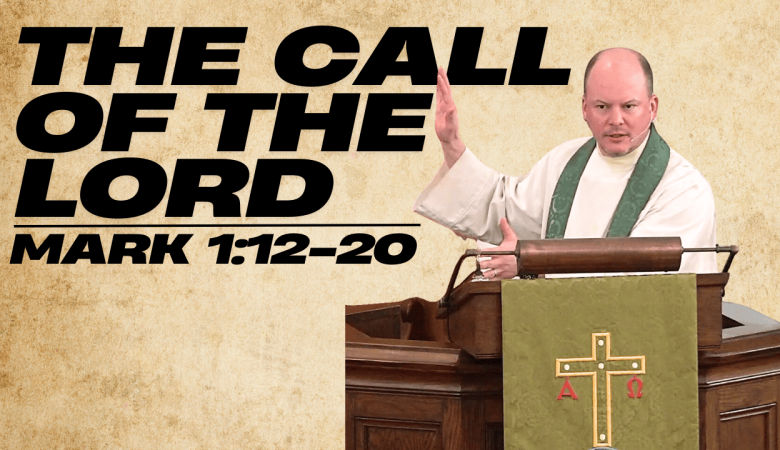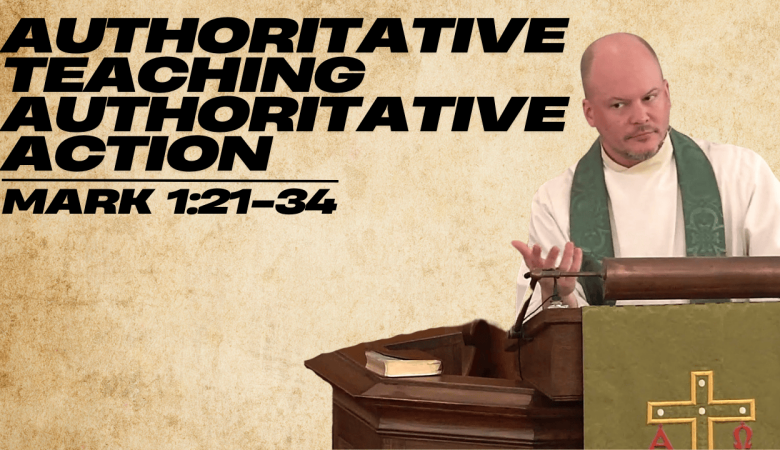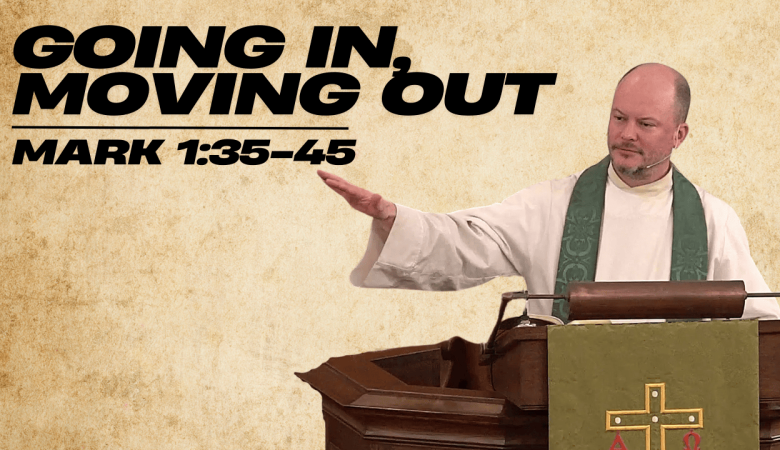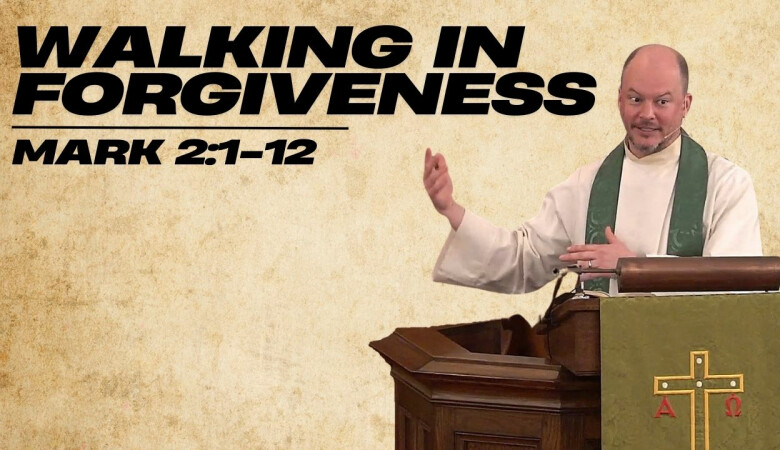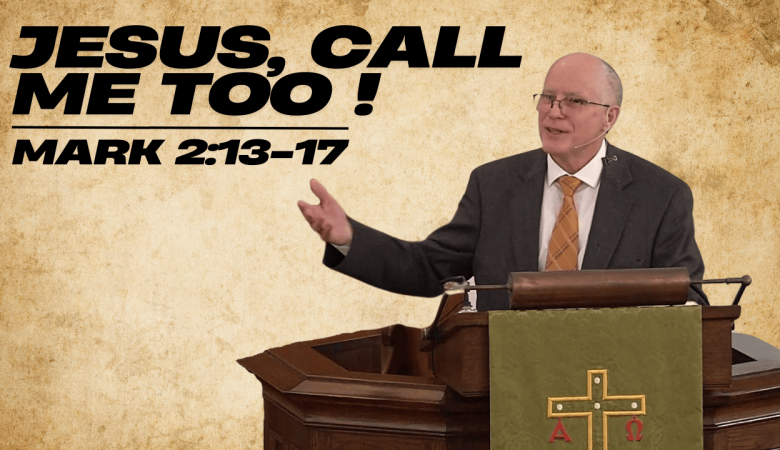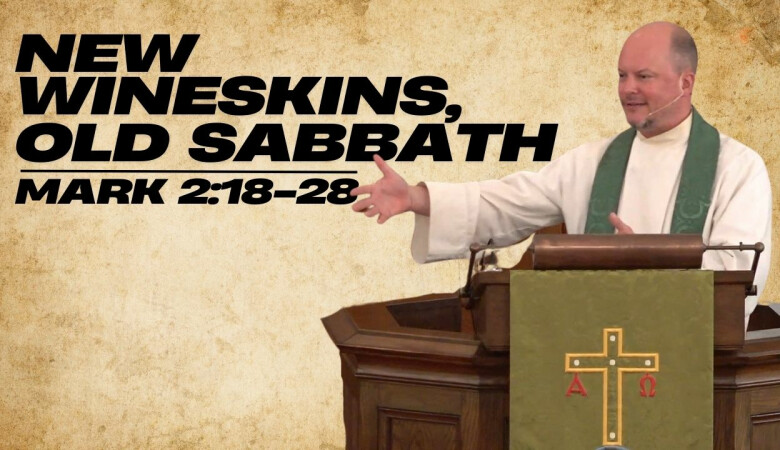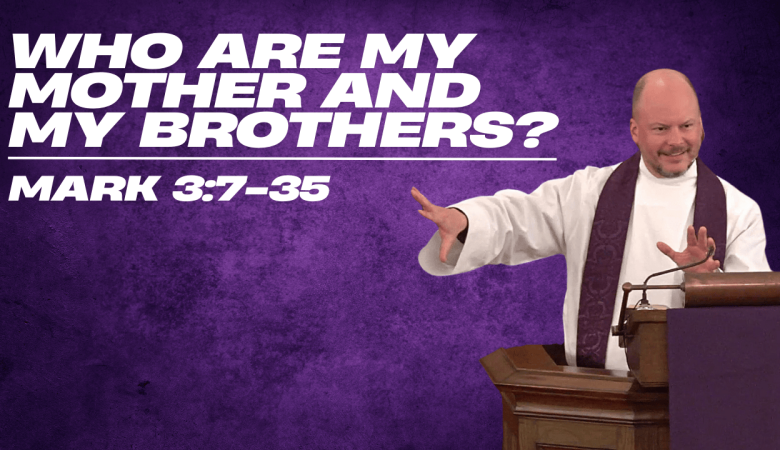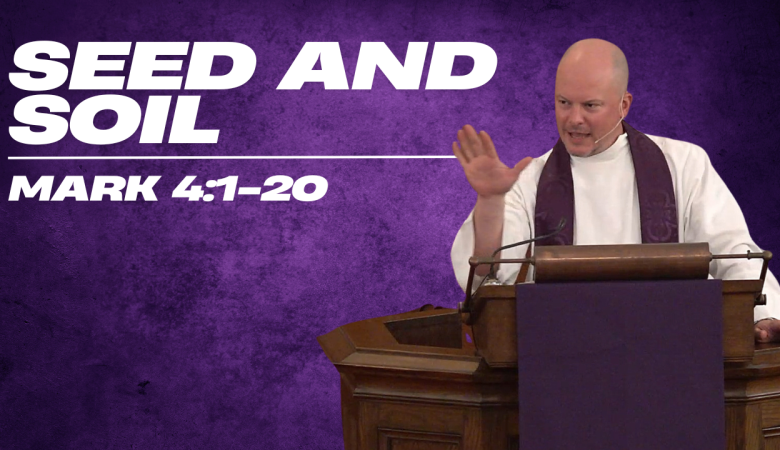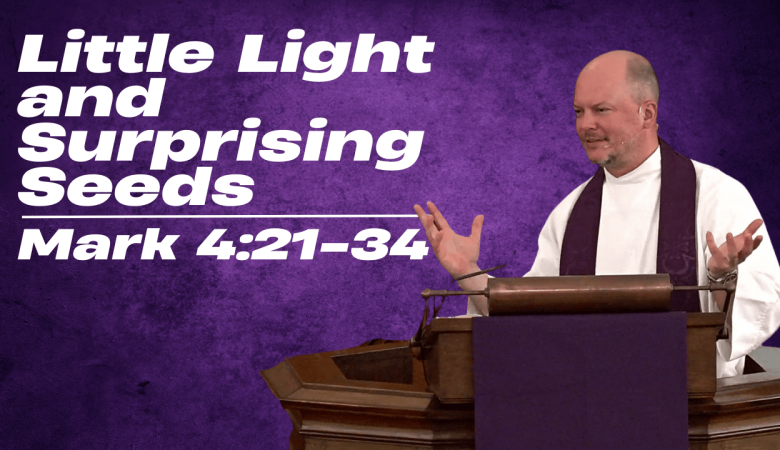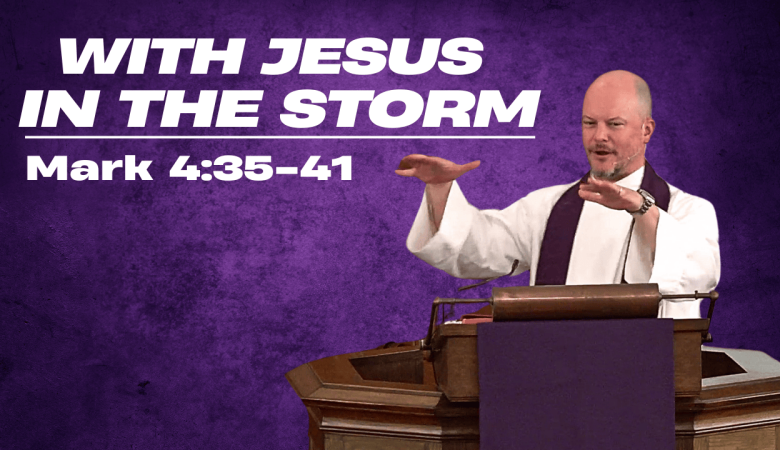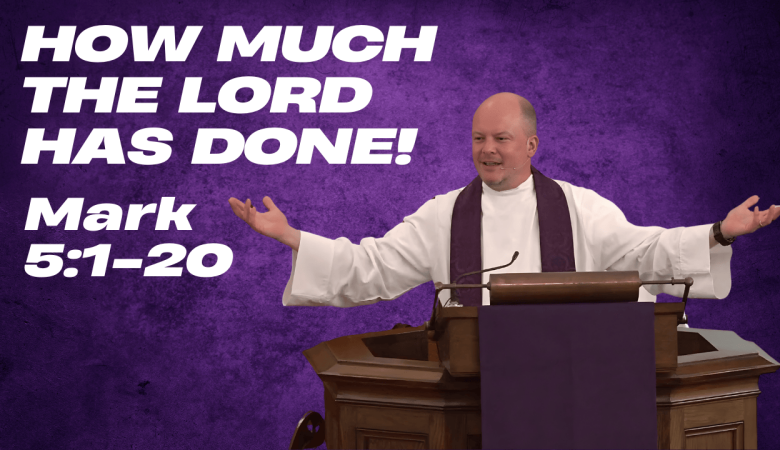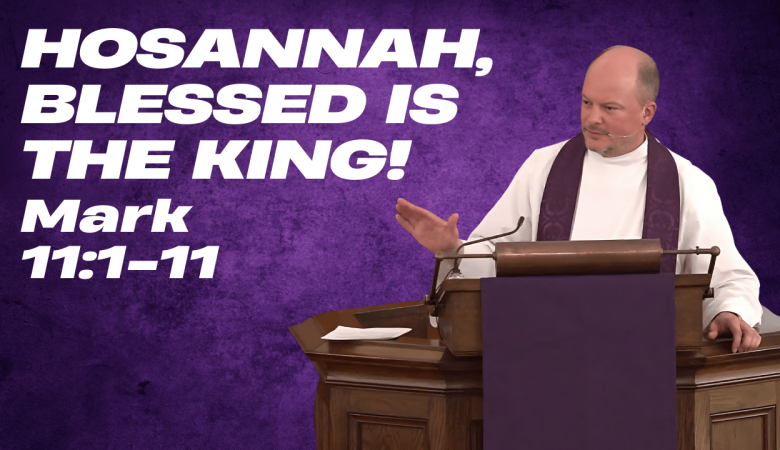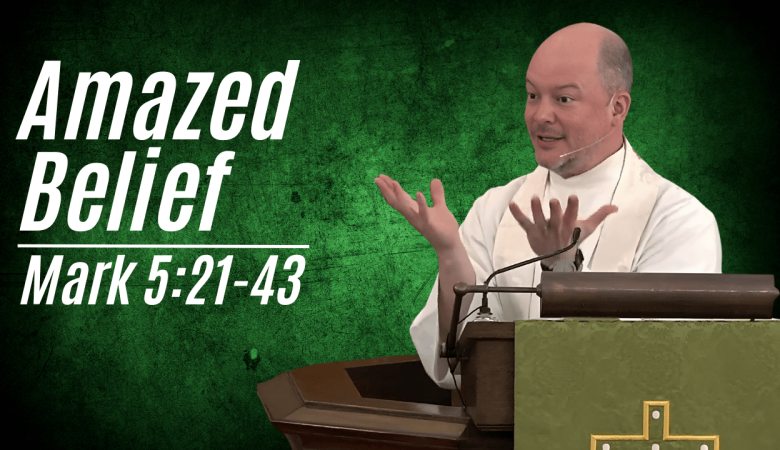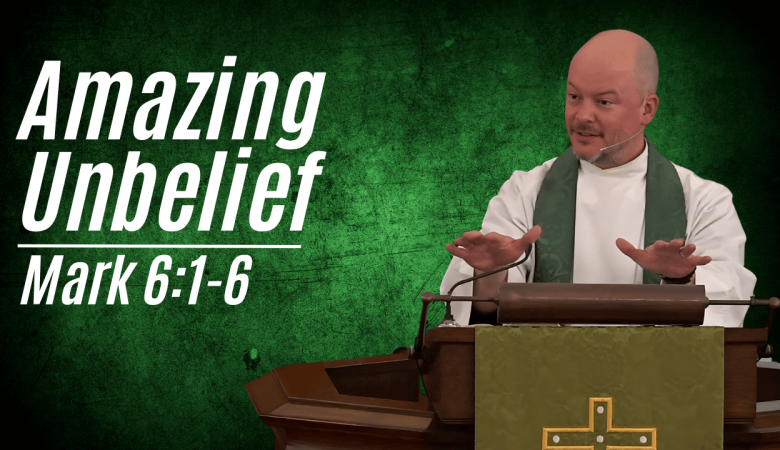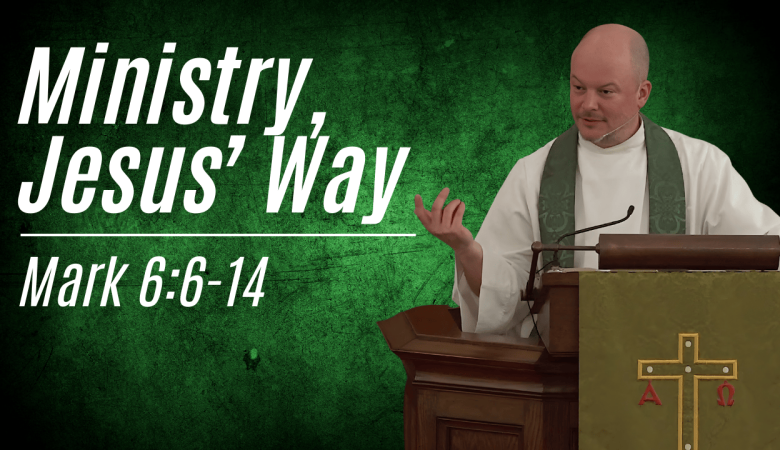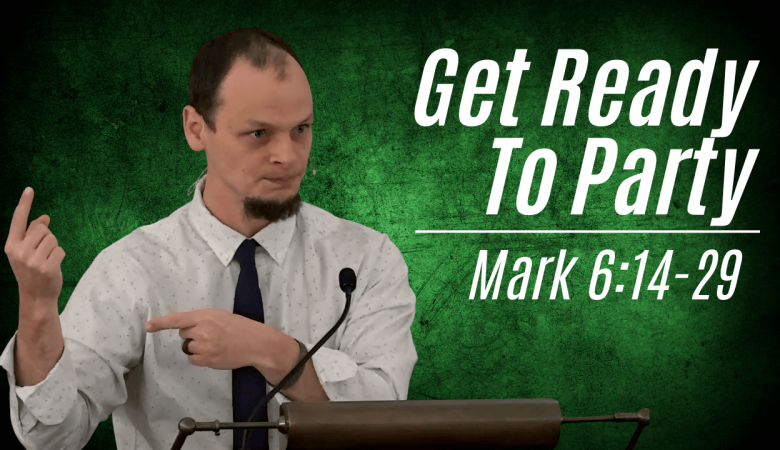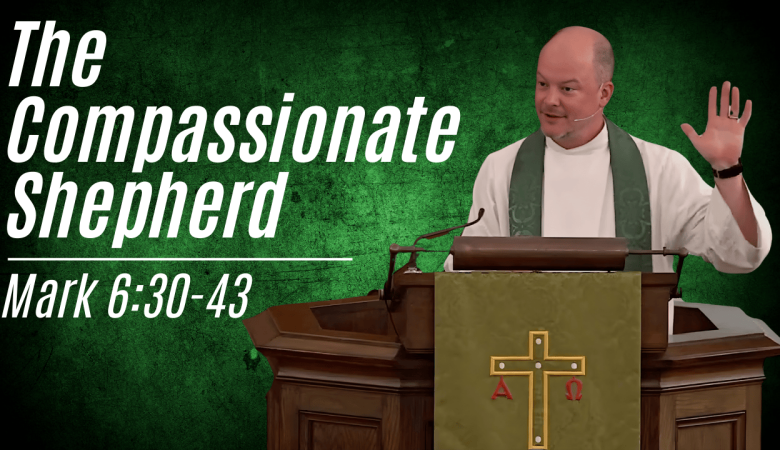Series: The Gospel of Mark
The Real Fantasy
April 20, 2025 | Peter Rowan
Passage: Mark 15:42-16:8
Summary
"The True Fantasy": Good stories are true stories. Not always in the sense that the events they tell happened in time and space, but, at the very least, a good story reflects an honest account of the world where the bad is not glossed over nor the good made little of. All good stories do this and all stories can be graded on this rubric: do they reflect THE Story? THE Story is the death and the resurrection of Jesus Christ. There we see in time and space the fact that things are so bad that the Son must die to redeem sinners, but they are so good because he conquers the evil, but death to shame in his resurrection. There we see that things are so much worse than we ever thought and God's grace is so much better than we ever imagined.
Transcript
Let's pray. Lord, we bless you this morning. We are so glad to be in your house and to hear again this central story to our faith, that the tomb is empty, that Jesus, you conquered death, you conquered sin, you conquered Satan by rising from the dead. The very curse that is upon humanity on this earth because of sin, you have reversed because of righteousness, the righteous one dying for the unrighteous God, I pray that our hearts be lifted up in astonishment and amazement that maybe even like these women, we might have a degree of holy fear, awe, wonder at what God has done. God bless us now today as we contemplate this story again, story of all stories, the risen Christ, in whose name we pray. Amen.
All right, some of you may know that there has been some controversy around the new Snow White movie. And you are all thinking right now, why is he starting a Easter sermon like that? Well, I hope it'll eventually make sense. We'll see.
It's true. There's some controversy around it. It had a budget of 218 million and it only made 42 million. It's opening weekend. Sad.
It's almost certainly going to be a financial flop. Rotten Tomatoes, for those of you who are abreast of these things, currently it's at 39%. The IMBD rating is 1.6 out of 10. That's actually less than half of Rotten Tomatoes, and Google has it at 6%.
Poor casting choices. These are some of the reasons. Politically motivated CGI characters, harmful racial stereotypes. It's too simplistic. It's too predictable.
It lacked suspense. It lacked emotional depth. It seems as though the controversy was mostly around people saying, it's just so bad, but not in, like a bad, evil way. You know, just bad, poorly done. And I don't know.
I didn't see it. I don't. I don't know. Okay. We did, though, a couple weeks ago, we were down in Richmond, Virginia.
We were down there for my niece's bridal shower, and we were hanging out with some friends, and one of our friends went to go see it with her daughter, and they loved it. And she had a theory about why it's gotten such bad reviews. I thought it was kind of interesting. So, you know, I'm always thinking, like, what can I share in a sermon? I put this one away, and she said, you know, I don't know if it's so bad or if we just live in a world where you can review anything and we are so polarized that we take any and every opportunity, just lambast anything we do not like or doesn't fit into our narrative or whatever have you.
And so she's saying, you know, I'm not sure that it's so much of a reflection of something so poorly done as rather just the poor state of people that, in fact, we are bad.
To be honest, I don't know. Either way, there's controversy because it's so bad.
And I don't know if that has to do with how bad the movie is or just how bad we are, but it's bad. Some of you know that the original Snow White and the Seven Dwarves came out in the year 1937. It actually came out in December, right before Christmas. They knew all the way back when, when to release certain things. Three months prior to that, another great maybe the Greatest Fantasy was released.
The book the Hobbit by JRR Tolkien came out just months apart. Snow White and the Seven Dwarves and the Hobbit. We know that Snow White was released actually in Great Britain in 1938, and Tolkien went to go see it, and he went to go see it with his good buddy CS Lewis. They went to go see Snow White together. When it was released in England, I would have loved to have just watched them watch it.
I'll just say this, they didn't really like it. Lewis wrote this. Dwarfs ought to be ugly, of course, but not that way. He said dwarfs of Snow Whites, they had bloated, drunken, low comedy faces.
I liked those little guys. Sounds a little bit like a Reddit review, but keep in mind these were the authorities of fantasy. Tolkien, he used words like loathing, vulgarity, corruption, disgust, nausea to describe Snow White.
Now, writing about Walt Disney particularly, he said that he was hopelessly corrupted.
I'm going to get it together here, he wrote, though in most of the pictures proceeding from his studios, there are admirable or charming passages. The effect of them, of all of them, to me, is disgusting. Some of them have given me nausea.
Oh, dear me, I got to get together now.
One of the articles that I read, this wasn't a quote, but one of the articles that I read said that Lewis expressed surprise that anything human could be so bad and so good. But here's what's interesting, is that their response actually had to do with the way the bad was portrayed and the way the good was portrayed, meaning that the bad wasn't quite bad enough and the good was sort of sloppy good, you know, slapstick humor of the Dwarves sing songiness names like Dopey, not honestly good makeup good, not honestly bad kind of makeup. Bad.
They said that Disney's took the real bad out of the story. Tolkien, you may know, wrote an essay. I'd encourage you to read it in 1947. It's called On Fairy Stories. And in that he actually says, the association of children and fairy stories is an accident of our domestic history.
He says in some ways what's happened is they've domesticized fantasy and fairy stories, dumbing it down in a way, making the bad not so bad and the good not so honestly good. You probably know that Snow White came from one of the great stories of the Brothers GRIMM, written in 18 or published at least in 1812. And I think you ought to hear actually just how bad the bad is. In the original Snow White, you may remember that the stepmother, the witch figure there, you know, she tells the Huntsman, bring back the heart in a box. That's not the original.
In fact, this is what she says to the Huntsman originally. Take Snow White out to the woods. I never want to see her again. Kill her. And as proof that she is dead, bring her lungs and her liver back to me.
Yeah, yeah, that's bad.
And this is how she dies at the end. She doesn't just fall because of some rocks. This is the quote from the original. Then they put a pair of iron shoes into burning coals. They were brought forth with tongs and placed before her.
She was forced to step into the red hot shoes and dance until she fell down dead. You're not laughing now, are you? That's bad. It's evil. The good.
Their critique was not good enough. It's not bad enough dopiness in a way. They would say the good was sort of a sappy and a shallow kind of good.
Said you have the Shire against Mordor, right? It's the word. If Gandalf against Sauron. I want to suggest to you this morning rather quickly, but I want to suggest to you that part of the controversy around Christianity is actually how much it says the bad is really bad and how much it says the good is actually deeply, unbelievably good. It's a true fantasy.
The bad's really bad. We've been in the Gospel of Mark together as a church this year. And so I thought, okay, our resurrection text this morning is going to be from Mark. So that's what we have before us. And one of the things I want you to see is actually this dynamic of how Mark seems to really focus in on the bad for us and then how he shows us the good.
Okay? And a lot of this this happens a lot when we're reading Mark is. He gets these little details. And often it's in those details that we actually are able to see, well, the text, okay, so we see some of these details of the badness. First.
First details that we see in our text this morning is actually, interestingly, sort of the Jewish observance of the Sabbath, but in the context of Roman subservience, the Jewish subservience to the Roman rule. So verse 42, if you look down there, it says when evening came, since it was the day of preparations, that's the day before Sabbath. It sort of highlights for you, okay, it's this Jewish context that's taking place. And then it jumps in. Joseph of Arimathea, respected member of the council, who is also himself looking for the kingdom of God.
Okay, you have this man. He's living in this Jewish world. He's expectant for what God would do. But it says he took courage. Meaning that even though he had a good amount of power, he was a member of the council, he certainly had financial means like you wouldn't believe.
He was able to carve this great tomb out of the rock. He has to take courage because why? He has to go and ask just simply for a body from the Roman ruler.
Roman ruler for a dead body. What these details are telling us is that the bad is actually really bad. Why? Because here's what's going on. The Jewish story was telling us and told the Jews that really the whole hope of the world was on this, that God was going to act through the Jewish story, Jewish people for the blessing of the whole world.
I mean, if you go back to the beginning, right? We look at this, this fall, actually, if you go back to Genesis and you see just how awful things are, you know, the original sin of the fathers goes to the next chapter where a brother kills his brother and uncles are vying and his power struggles. Then things are so bad that the flood happens and they're so bad the rebellion against God. The tower is Babel's built. And then God says, I've got to do something about just how bad this is.
Abraham, I'm going to bless you. And through your offspring all the nations of the world are going to be blessed. That's the story of Israel that they are living to. And what happens right here is we are reminded yet once again that simply an act of. Can I just bury this body of this Jewish rabbi, this teacher?
And you know what? You can't just do that because you are under the heavy thumb of Rome. It's bad. The hope of the world seems totally gone. It is bad.
But really, actually, it's the next details that give us a greater sense of how that is. And that's because the next details, especially in light of just hearing about Pilate, tells that an innocent man is dead. So, you know, I just mentioned that Joseph of Arimathea, he goes to Pilate. But here's an interesting thing. If you keep Pilate in mind, what you might remember is that in the Gospel of John and in the Gospel of Luke, Pilate actually tells us, twice in John and once in Luke, this man's done nothing wrong.
That's Pilate. We're supposed to be remembering that. And actually, in the Gospel of Matthew, what we learn if we read the Gospel of Matthew, what we'd find is that his wife even has this dream. And she says, don't deal with this man. He's innocent.
Don't engage with him. So the Pilate story should be going on in our minds. We're thinking, here's an innocent man, an innocent man that is put to death. But actually, what's really kind of wild is that Mark seems to just beat into us this fact that he is dead. He's dead.
Listen to this again, okay? If you want to look down, you can follow along with me, but you can also just listen to it. This is verse 44 and verse 45. Pilate, again, keep all that in mind. Mentioned twice the end of 30, 43, and 44, trying to help us keep in mind Pilate's position on all this.
Pilate was surprised to hear that he should have already died. And summoning the centurion, he asked him whether he was already dead. And when he learned from the centurion that he was dead, he granted the corpse to Joseph. Now, of course, there's a way to write that that doesn't emphasize this, right? He was surprised that he should have already died and summoned the centurion.
He asked him was it true? And when he learned from the centurion that it was true, he gave. You know, what's Mark doing for us? Mark is saying, this innocent man died. There is no question Pilate doubted it.
He says, wait, go check it out. Checks it out. He's like, yes, you have to confirm it. And Mark again and again and again is telling us this man died. Don't think it's, you know, figment of your imagination, just wishful thinking.
Some, you know, story that's kind of made up. The bad is bad in the Bible. The Innocent man, the only innocent man goes to death in the Bible.
We continue on, what we find is the death actually of hopes and dreams for the kingdom of God. It's kind of interesting. So if we continue on. Sorry. In verse 45 and 46, again, remember 43 and 44, you have Pilate mentioned at the end of 43 and then at the end of 44 to give context for those.
Well, at the end of 45 and the beginning of 46, Joseph again is mentioned. He's actually mentioned three times in the story Arimathea. So verse 45, you know, when he learned from the centurion that he was dead, he granted the corpse to Joseph. And Joseph brought a linen shroud and take it with him. Listen to this.
All the details. He brought a linen shroud, taking him down, wrapping him in a linen shroud, he laid him in a tomb. Joseph is doing all of these things. He buys the thing, he takes them down, he wraps them, he lays him. And what do we know about Joseph?
Well, what we'd first heard about him, he was a respected member of the council who was looking for the kingdom of God. Which is to say that for this man, in this little detail that we're given is that in this story, the hopes are dashed. We actually have another great story in Luke 24 that we're going to see next week, but the hopes are dashed. Your greatest desire for God to act in the world, Right. He was looking for the kingdom of God, gone.
What I'm saying to you is that this story that we have in the Bible is not glossing over things. It's not dumbing down the tragedy, the evil, the badness of it all. It's sort of putting it right in our face. This is bad.
As if to continue on, what we have here is next is we have the Marys. Some of you might have noticed in verse 47, it says, Mary, the mother of Joses. Verse, the second part of that says, Mary, the mother of James. To be honest, we don't know if those are the same people or not. They're the Marys.
There's quite a few Marys in the story, if you're really interested. I shouldn't get into it. The mother in 47, that word is not necessarily there. It's kind of debated. I'm not going to get into that.
Here's the point. With the Marys, they prepare these embalming spices. Why are they doing this? Why would they do this? But because the body is going to stink.
There's no question in their mind that their great loved one, who they spent all these years with, Mary reared her son, who heard the angel Gabriel long ago say what God was going to do in and through her preparing spices because her son's body is going to rot.
There is no glossing over the evil, the bad, the fact of death, the effect of sin in this world. It doesn't happen in this story.
Of course, there's also a theological description that's taking place in all of this.
The evil in the world and the sin in the world are so bad that the innocent must die, that the God man, right proclaimed to Mary long ago must actually be put inside a tomb, must expire. Your sin demands the very death of God. That's how bad it is. That's how wrong it is.
I would guess that today there may be some of you who, I don't know, don't think much of the Christian story. Maybe you don't buy it. Just, just allow this, this little bit to challenge you today, that at least Christianity doesn't gloss over the ugly. Because you all know, I know how bad this world is. So fraught with not just, not just wars between countries, but wars in our hearts, wars in our families.
We know how ugly the world is. Christianity doesn't pass over that as though it's nothing.
No, here is the very death of God, how wrong the world really is. But it is also into this context that the good shines, that the good is not a good of slapstick humor and dopey dwarves and all that.
This story tells us how bad the bad is. It is also so deeply concerned with how much we know the good.
You know, your Bible's seem to have the turning point in chapter 16, verse 1. That doesn't seem to fit as well. I don't think. I think, I think we should start in verse two. Okay, so let me just read to you just the beginning of verse two.
Actually. Yeah, let me read to you most, most of verse two. And very early on the first day of the week when the sun had risen.
Did you get that? Just. Just a few little things. Very early first day of the week when the sun had risen. It is almost as though you're saying Mark himself is saying, wait a sec, you thought, you thought the bad was just gonna.
Gonna make it. You thought that it was just gonna be always as bad as you have always experienced something is about to happen. I mean, just these details that Mark gives us almost want us to go, wait, what's going on? Something new is breaking in the embalming spices aren't needed. And then consider the next deal, the stone.
It's almost as though Mark again is saying, wait, something is happening you never expected. It's the impossible. Verse 3 and 4. And they were saying to one another, you know the sort of things you say when you walk along the side of the road, who will roll away? The stone forks from the tomb in a sense of how grand it was and how secure it was.
Verse 4. And looking up, they saw the stone having rolled back. And Mark wants you to see just how good it is and how wild it is and how unexpected it is. It was very large. What a simple statement.
You would have never guessed it. You would have never guessed it. It was very large. Something new is breaking in. The impossible is happening.
The good is beyond what we would imagine. And then there's the young man, Verse five, entering the tomb. They saw a young man sitting on the right side, dressed in a white robe. And they were alarmed, which I always just thought is so wild. It's almost like the good is so good that he's peaceful about it.
And he said to them, do not be alarmed. You seek Jesus of Nazareth who was crucified. He has risen. He's not here. See the place where they laid him.
The bad. He's crucified. See the place where they laid him. But the good, and oh, how good, how unexpectedly good. He's risen.
The tears that were flowing, right. The world that we live in, where it just seems incessant, the wrong that happens, the evil empire crushing the one good man ever to have lived. He's risen. He's not here. He's gone ahead of you, Galilee.
Of course, trembling and astonishment and fear grab ahold of them. Right? Of course, here is true fantasy, but the best, the best fantasy, the bad is not merely a little bad. It's awful, horrendous. And the good is, oh, so beautiful.
You know the controversy around the cross and the resurrection, the controversy still is that the cross declares to us that things are even worse than you thought, actually. I mean, the God man had to become human and actually die an innocent death in the worst way possible on the cross. God himself. That's what sin demanded. The torture and the affliction of God in the flesh.
It's way. I mean, this is the offense of the cross. You are way worse than you think. Part of its controversy, of course part of its controversy is also, also is that the empty tomb and the cross declare to you how wild, how amazing, how unimaginably great. God's grace is unbelieving.
The stone was large. The boy was just sitting there. He is not here. He's risen.
You see, if Jesus didn't die, well then maybe God is just shrugging off evil. Maybe if he doesn't come, he's not thinking it's much of a big deal. You know, maybe we can have a tame evil stepmother who just puts the heart in the box. You don't have to face actually what happens.
But Jesus did die. Then we can't do that. We can't shrug off. You're not invited. You shouldn't dismiss the trolls, the Uruk Hai.
Right. Or just simply turn a blind eye to the power hungry, the money grabbers, people that have hurt you, ways you've hurt others. The sin that has been inflicted on you and the sin that you've done to others, you are not invited to turn a blind eye to that because God has not done so. Evil is evil. We don't have to dismiss what has happened to us.
Jesus had to die, and he did die, then it is God's own declaration of just how bad things are, how awful the world really is. But if that's true, which Christianity says it is, the fact that Jesus rose from the dead, the fact that he says he is risen, he's not here, well, that changes things too. Because that actually means that even into this world, even in this world where the empire is over, the people of God with their heavy thumb ultimately saying, everything will be all right.
I'm with you always. I have control of it all. As we sang, Death cannot hold me down, I've overcome, I will take you safely to myself. If God in Christ raised from the dead, if he rose from the dead, that is true, that in the bleakest moments of your life, God is holding you, saying, you will be alright. If I gave my life for you, if I conquered Satan and death for you, you are always secure in my love.
Whatever pain cripples you, whatever fear overcomes you, whatever experience seems to cloud your judgment, Lord holds you in his hands. All of the bad is truly so bad. But God says the good is beyond your imagination.
Let me try to wrap this up.
So at least some of you now know that there's controversy around Snow White. You all do now I've declared it to you. It's true. You can look it up. My guess is that some of you knew that.
Some of you might also know that in Tolkien's great trilogy, Frodo the great ring bearer leaves with the Fellowship. Actually, let me just ask this. What day do they leave from Rivendell?
December 25th. Interesting.
Do you know what day Frodo is at Mount Doom and destroys the ring?
March 25th. It's interesting. Now let me put those things together for you. March 25th has been the day for most of the church's history that the church has celebrated what's called the Feast of the Annunciation. The Feast of the Annunciation is the day that we remember actually Gabriel coming and meeting there with Mary, the inception of Christ.
And in the ancient world, and actually it's been believed for as long as we know. Well, in the ancient world, a great prophet would die actually on the day of his conception. And so the church for a long, long time celebrated that. It was March 25th. By the way, March 25th was also the day that for a long time the new year began.
Because the new year began at the day of Christ death. Anyway, for many people, many years people believe that March 25 was the day of that first Good Friday long ago.
You see what I'm saying is that. And you might know this actually, I hope you. Gosh, this is kind of getting to the nerdy Lewis, Tolkien kind of stuff. We've already gone there, so let's keep going.
Some of you know that Tolkien really didn't like. Actually he gave Lewis a really hard time for the Narnia books because they were too explicit about who Jesus is. By the way, he's the lion.
And he didn't like how explicit he was. He thought fantasy should be hiding things more. But you know what Tolkien did is he had not the ring bearer who was taking this ring of power, right, which is the ultimate sign of corruption and how it corrupt others hearts. But he actually has the crossbearer carrying this sign of power and corruption and sin and making his way not up Mount Doom, but up Mount Calvary. And what does he do is he crushes it.
He destroys it there on the cross. And how do we know he does that? Because of the empty tomb. That's it. That is the great fantasy.
Tolkien knew that. Lewis knew that. I hope you know that. And what makes a great, great story, but it tells the truth, the true account of the way the world is. And you have to wrestle with that.
Does your accounting of the world take into consideration how truly awful things are and yet how deeply beautiful and hopeful things are? Friends, that is what we have in Easter. That is what we have in the cross. God saying the bad is beyond what you could have thought and the good is beyond what you would ever imagine. That is why we celebrate Easter.
Let me pray for us. Lord God, Heaven God, we bless you. That you are the one who took on Satan's sin and death perfectly on the cross. That you destroyed the powers of this world that would weigh us down, that would cause such global catastrophe, that would take our hearts and twist them.
They would cause the likes of Saruman to grab and to destroy goodness of the world and all the rest. Lord, how evil evil is. And yet, Lord, we are so delighted that you take that on, that you don't brush it aside. But you go to the place where evil is most pronounced, a Roman cross. And you die there, the innocent one, for those who are guilty.
And you conquer Satan's sin and death in the resurrection. Lord, we bless you for this. This morning. We praise you, we worship you, we adore you. God, I pray that you lift our hearts to this reality.
God, whether we have been following you for decades upon decades, or whether this morning we're here, and we don't know why we're here, and we're not even sure we like being here, but, God, I pray that you might move in our hearts a little bit to say, does my account of the world even make sense of these things? Challenge us with the cross and the empty tomb this morning. Do this great work in us. We bless you. We say hallelujah.
Praise be to God for the great work you have done. In whose name we pray. Amen.
Series Information

Mark's gospel is fast. He jumps right into what is central to the good news, the gospel, of Jesus. John the Baptist comes, and he is great, but his whole message is one of preparation for the greater one who would come after, Jesus. And everything John says has to do with this comparison of just how great Jesus is. We also see this through the writer of the gospel, Mark, and the apostle who was behind Mark's writing, Peter. Then we quickly move to Jesus' baptism by John and we see here the other central idea of the gospel, that this great one who has come humbles himself to associate and own the sins of humanity. Here is good news!


